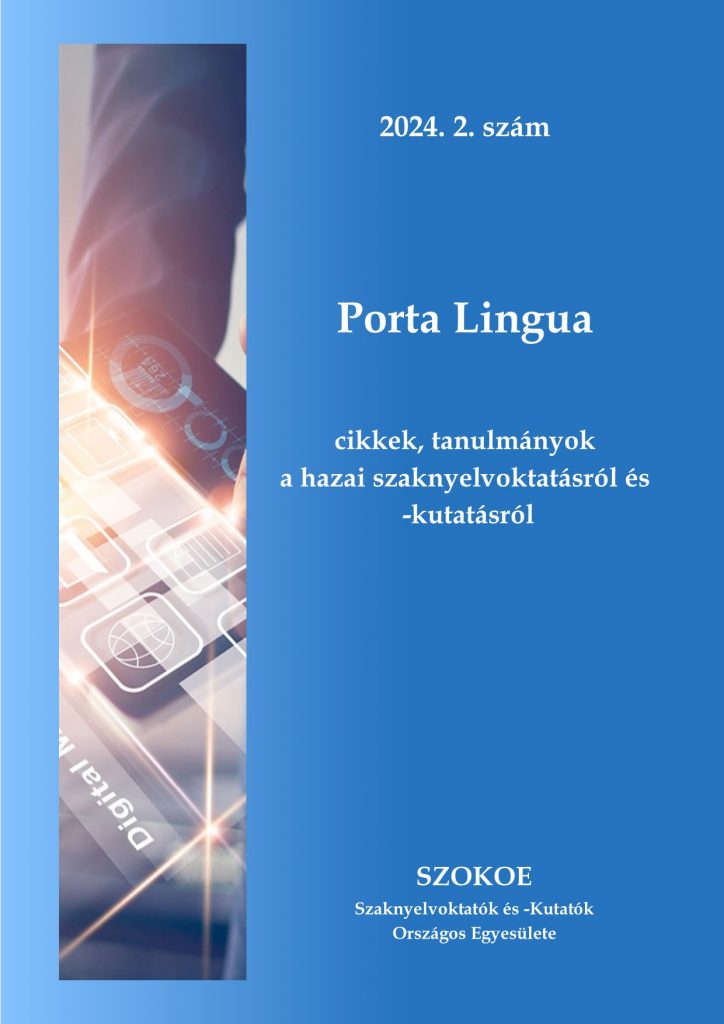Sturcz Zoltán
Műnyelv: szaknyelvfogalmunk történeti előzménye
![]()
Sturcz, Z. (2024): Műnyelv: szaknyelvfogalmunk történeti előzménye. Porta Lingua. 2024/6. 67-83
DOI: https://doi.org/10.48040/PL.2024.2.6
Absztrakt
A műnyelv fogalom, illetve terminus a XIX. század első felében a nyelvújítás és a reformkor nyelvi küzdelmei alatt nyert polgárjogot, és egyértelműen a tudományok nyelvének a körülhatárolására alkalmazták. Kezdettől fogva vele mintegy szóbokrot alkotva kapcsolódott hozzá a műszó és a műszótár fogalma is. A műnyelv fogalom mind a mai napig használatos, és a szaknyelv szinonimájaként jelenik meg a nyelvészeti és a tudományos szakirodalomban. Jelentéséhez az első alapjelentésen kívül később főként a mesterséges nyelv fogalma társult, de ma már további jelentések is kapcsolódnak hozzá. Műnyelvünk vagy szaknyelvünk sok szállal kapcsolódik a nyelvújításhoz, illetve a reformkori magyar tudományos élet fórumainak megteremtéséhez. Bár megállapítható, hogy a magyar műnyelv megteremtéséhez számtalan, már a korábbi századokban megszülető kezdeményezés és mű kapcsolható, és a klasszikus nyelvújítás korát megelőző XVIII. századvégi nyelvfilozófiai és tudományos művek adják az alapokat a XIX. századi felvirágzásához. A XIX. század történelmi hullámzásai több periódust mutatnak műnyelvtörténetünkben: a reformkori fellendülést, az abszolutizmus évei alatti tévutakat, a kiegyezés után az újabb eszmélést, majd az újortológia harcaiban és ellenküzdelmeiben egy kitisztulási és teljes felépülési folyamatot. Megjegyezhető, hogy szórványszerűen a XIX. század második felében már a szaknyelv fogalom is megjelenik, de a műnyelv fogalmat egészen a XX. század közepéig nem tudta széles körben felváltani. A XX. század második felében aztán a műnyelv, szaknyelv fogalom mellett újabb – részben kísérleti vagy közelítő – fogalmak is
megjelentek úgy, mint technolektus, szociolektus, csoportnyelv, tudományos nyelv.
Kulcsszavak: tudománytörténet, szaknyelvtörténet, terminus, nyelvújítás, nyelvfejlesztés
____________________
Technics: The historical prelude to our concept of terminology
The concept of technics became naturalised in the first half of the 19th century in the struggle for language during the Reform Age and the language reform in it. From the very beginning, it was closely connected to the concepts of technical terms and the dictionary of technical terms. The word ’technics’ has been used since then and it turns up as a synonym for terminology in the linguistic and scientific literature. Apart from its basic meaning it became associated with the notion of artificial language later, but nowadays there are also other meanings attached to it. Our technics or terminology is connected to the language reform and the establishment of forums of the reform forums of the Hungarian scientific life in the Reform Age in many ways. However, it is true that several initiatives and works from the previous centuries can also be connected with the birth of Hungarian technics, and works in science and language philosophy written at the end of the 18th century provide the basis for its flourishing in the 19th century. The changing historical trends in the 19th century show several periods in the history of Hungarian technics, namely the boom in the Reform Age, the diversions in the time of Absolutism, the new awakening after the Compromise, and clearing up and complete recovery in the fights and conflicts of new orthology. It can be mentioned that although ’terminology’ appears sporadically in the second half of the 19th century, it could not widely replace ’technics’ until the middle of the 20th century. Then in the second half of the 20th century, along with the concepts of technics and terminology other – partly experimental or approximate – concepts like technolect, sociolect, group language or scientific language appeared.
Key words: history of science, history of terminology, use of concepts, language reform, language development.


 Porta Lingua 2024. 2. szám
Porta Lingua 2024. 2. szám